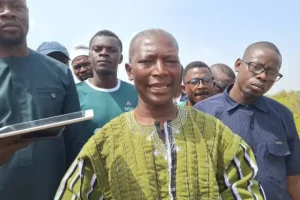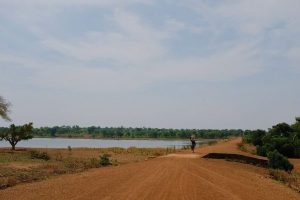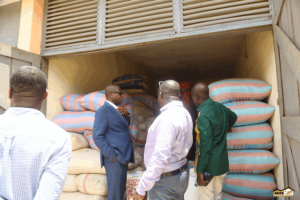
Jun 13, 2025
The Minister of Food and Agriculture, Dr. Bryan Acheampong, has assured Ghanaians that there will be no food shortages in the coming months. Speaking at the launch of the government’s $200 million Tree Crop Diversification Project in Accra, he expressed confidence that food prices would remain stable, particularly ahead of the festive season.
This assurance comes as the cost of food in Ghana rose by 22.8% in October 2024 compared to the same period in 2023, according to the Ghana Statistical Service. Food inflation in Ghana has averaged 14.99% since 2013, with a peak of 61.0% in January 2023 and a record low of 5.0% in July 2014.
The Ghana Tree Crop Diversification Project, launched in partnership with the World Bank, aims to address challenges in the country’s food supply system by promoting the production, processing, and trading of six high-value tree crops: cashew, shea, mango, coconut, rubber, and oil palm.
According to the Ministry of Food and Agriculture, the project is expected to directly benefit 52,775 farmers and households, with a focus on cocoa, cashew, coconut, and rubber farmers. Additionally, 185 small and medium-sized enterprises (SMEs) engaged in processing these crops will also gain from the initiative.
Dr. Acheampong highlighted the tree crop sector’s critical role in agriculture and the economy, providing income for over 1.6 million farming households. The initiative is projected to create 20,000 jobs, with 60% targeting youth employment.
Under the theme “Sowing the Seeds of the Future: Unlocking Ghana’s Tree Crop Potential for Inclusive and Sustainable Transformation,” the project seeks to address key challenges such as deforestation, climate change, and other environmental threats that jeopardize the country’s agricultural sustainability.
In addition to diversification, the government is focusing on modernizing the cocoa sector. The Cocoa Board (COCOBOD) is currently implementing its second Cocoa Sector Development Strategy (CSDS-II), spanning 2017 to 2027.
“This strategy addresses past shortcomings, including ineffective management of the Cocoa Swollen Shoot Virus Disease (CSSVD) and the lack of robust information systems,” Dr. Acheampong noted.
Key interventions under CSDS-II include: enhancing productivity and efficiency, driving innovation and quality management, improving traceability and certification and economic benefits.
Dr. Acheampong emphasized the significant opportunities offered by the tree crop sector for economic diversification, job creation, poverty reduction, foreign exchange earnings, and gross domestic product (GDP) contribution.
Despite Ghana’s ample arable land for cocoa production, the minister acknowledged the growing threats posed by deforestation and climate change. He warned that if these trends persist, many cocoa-farming households could face economic hardships, and the country’s foreign exchange revenues could decline.
The Tree Crop Diversification Project marks a critical step toward ensuring inclusive and sustainable transformation of Ghana’s agricultural landscape while bolstering food security and economic resilience.

Jun 13, 2025
 Simon Akibange Aworigo, Member of Parliament for Navrongo Central, has reaffirmed his commitment to driving socio-economic development in the constituency through agriculture, with a special focus on empowering women farmers.
Simon Akibange Aworigo, Member of Parliament for Navrongo Central, has reaffirmed his commitment to driving socio-economic development in the constituency through agriculture, with a special focus on empowering women farmers.
Speaking during a visit by Deputy Minister for Agriculture, John Dumelo, to the Irrigation Company of Upper Region (ICOUR), Aworigo emphasized the importance of supporting the 2,100 women farmers across 43 farming groups within the Tono Irrigation Scheme’s catchment area.
“We will ensure that whatever support women farmers need—aside from equipment—we will provide. If it’s beyond our reach, we’ll seek help from the Ministry,” he stated.
Simon Akibange Aworigo, Member of Parliament for Navrongo Central, has reaffirmed his commitment to driving socio-economic development in the constituency through agriculture, with a special focus on empowering women farmers.
Speaking during a visit by Deputy Minister for Agriculture, John Dumelo, to the Irrigation Company of Upper Region (ICOUR), Aworigo emphasized the importance of supporting the 2,100 women farmers across 43 farming groups within the Tono Irrigation Scheme’s catchment area.
“We will ensure that whatever support women farmers need—aside from equipment—we will provide. If it’s beyond our reach, we’ll seek help from the Ministry,” he stated.
Aworigo highlighted plans to support women in acquiring farmland and accessing financial assistance to enhance productivity. He also expressed intentions to collaborate with agriculture-focused NGOs to provide both financial and technical support.
“The small issues like access to land and other essentials will be addressed to ensure the women can increase their output,” he added.
Deputy Minister John Dumelo, on his part, assured the government’s commitment to solving the challenges facing farmers under the irrigation project. These include poor road networks, lack of farming machinery, and limited subsidies on farm inputs.
Dumelo, who was on a familiarization tour, engaged with local farmers and urged them to continue their essential role in feeding the nation.

May 14, 2025
Accra, May 14, 2025 — The Ghanaian government has officially unveiled a strategic initiative aimed at transforming the country’s agricultural landscape through the formation of farmer cooperatives under the flagship Feed Ghana Programme. This move, announced today by the Minister for Food and Agriculture, Hon. Eric Opoku, is expected to empower smallholder farmers, enhance productivity, and accelerate Ghana’s journey towards food self-sufficiency and economic resilience.
In a comprehensive press briefing held at the Ministry’s conference room, Minister Opoku emphasized the critical role that farmer cooperatives will play in achieving the government’s ambitious goals, including the realization of the 24-Hour Economy envisioned by President John Dramani Mahama.
A Strategic Shift Toward Farmer Organization and Empowerment
“Cooperatives are proven instruments of empowerment,” Minister Opoku stated. “They enable farmers, especially smallholders and vulnerable groups, to benefit from scale, collective bargaining, and better access to resources. Forming cooperatives is not just an administrative step; it’s a strategic pathway to transforming our agriculture sector.”
The Minister highlighted that organized groups of farmers will be at the forefront of accessing the full range of support offered through the Feed Ghana Programme, which is designed to stimulate productivity, improve market access, and ensure sustainable development.
Key Support Components of the Feed Ghana Programme
The initiative will facilitate farmers’ access to several critical services, including:
Farmer Service Centres (FSCs): Providing mechanization, input distribution, extension services, and climate-smart technologies, with cooperatives prioritized for access.
Financial Services: Partnering with banks to deliver tailored financial products such as savings, insurance, and mobile money platforms.
Credit and Investment: Enabling registered cooperatives to secure loans, high-yield breeds like Kuroiler chickens, feed subsidies, and training.
Input Subsidies: Offering prioritized access to subsidized seeds, fertilizers, and animal feed.
Training & Capacity Building: Equipping farmers with modern farm management, agribusiness, and digital agriculture skills.
Market Linkages: Supporting cooperatives to negotiate better prices and establish long-term contracts with government agencies, hospitals, export markets, and other institutional buyers.
Policy Inclusion: Giving farmers a voice in national policy discussions at various levels.
Additional Benefits and Call to Action
Beyond immediate support, the formation of cooperatives promises long-term benefits such as knowledge sharing, bulk purchasing, collective marketing, and social safety nets. It also enhances the sector’s appeal to donors and NGOs, fostering further development.
The sector minister urged farmers, particularly women, youth, persons with disabilities, and smallholders, to seize this opportunity. “Our district offices stand ready to assist you in registration, governance training, and linkage to support services. We will also be conducting sensitization campaigns across all regions to ensure widespread awareness and participation,” he assured.
Looking Ahead
The Ministry of Food and Agriculture plans to collaborate closely with traditional authorities, local government bodies, and development partners to facilitate the rapid formation and formalization of farmer cooperatives nationwide. The initiative aims not only to improve food security but also to create jobs, foster rural development, and build a resilient agricultural economy capable of meeting both domestic and export demands.
As Ghana steps into this new era of agricultural transformation, the government’s message is clear: unity, organization, and collective effort are key to feeding the nation and ensuring prosperity for all.
For more information or to participate, farmers are encouraged to contact their local agricultural offices.
Source:- Mofa

Apr 11, 2025
Management and Staff of the National Food Buffer Stock Company (NAFCO) have been sensitized on the Right To Information Act.
It was organized by the Corporate Affairs Department of the company and the RTI Unit with resource persons from the Access to Information Division of the Information Services Department. The purpose of the program was to deepen the awareness of the Right to Information Act among staff of the company.
The training had resources persons from the Access to Information Division of the Information Services Department, namely Madam Bridget Mensah (Head, Access to Information Division), Mr. Sostheness Senanu Nyadroh and Mr. George Basoah Frimpong, both Deputy Chief Information Officers at the Information Services Department.
Mr. George Abradu-Otoo, the Chief Executive Officer at the Company, in his welcome address thanked the resource persons for taking some time off their busy schedule to help sensitize staff and management on the various provisions prescribed in the RTI Act
The resource persons in turns took participants through, the general background of the RTI Act, merits of the Law, duties of public institutions in relation to the RTI Act, the processes and timelines involved in applying for information, the review mechanisms and the exemptions outlined in the RTI Act.
Madam Bridget Mensah accentuated on the importance of the RTI Law in fighting corruption and promoting transparency in governance.
She outlined the duties of public institutions under the Act thus: the compilation and publication of the Information manual, establishment of an information unit headed by an Information Officer, submission of annual report to the Right to Information Commission and keeping accurate and authentic information. She also touched on the duties of the Access to Information Division established under the Information Services Department.
Explaining the processes involved in applying for information, Mr. George Frimpong Basoah stated that application for information under the RTI Law must be in writing. However, persons living with disabilities and illiterates can make an oral application and this application will be reduced into writing by the Information Officer. Addressing a question from the Chief Executive Officer on who should receive a request, Mr. Basoah clearly stated that the first point of contact is the Information Officer with approval from the Chief Executive Officer.
He stated that the RTI request must be processed within 14 days upon receipt and applications involving the liberty and life of an individual must be addressed within 48 hours.
Mr. Senanu Nyadroh sensitized staff on the exemptions in the RTI Act. Personal information, privileged information, internal workings within an organization, information on the President and his vice, cabinet information and information on national security. He also took participants through the fees and charges and sanctions under the Act.
The interactive session was followed up with questions from the engaging participants with answers provided to each of them from the resource persons. At the end of the training session, Head of Corporate Affairs, Mr. Emmanuel J.K Arthur stated that participants have learnt a lot from the training and will make good use of the knowledge acquired. He also thanked the Chief Executive Officer, his deputy, and the resources persons.

Apr 9, 2025
Wa, April 9, 2025 – The Ministry of Food and Agriculture (MoFA), in conjunction with the Regional Directorate of Agriculture in Wa, had the pleasure of welcoming His Excellency Jules-Armand Aniambossou, the French Ambassador to Ghana, and Clémentine Dardy, the Country Director of the French Development Agency (AFD), during their visit to Northern Ghana from April 7 to 10, 2025.

The visit offered an essential platform for MoFA to unveil two significant agricultural initiatives. The first initiative is the Agricultural Water Management Project (AWMP), aimed at enhancing irrigated agriculture through the construction and rehabilitation of over 20 dams and the establishment of more than 30 boreholes. The second initiative focuses on the sustainable development of four vital value chains: shea, beekeeping, soybean, and vegetables. Both projects are financed collaboratively by AFD and the European Union (EU).
These initiatives share a common objective of boosting agricultural incomes and promoting inclusive, climate-resilient economic growth in rural areas across Northern Ghana, with a target to benefit 50,000 individuals across 25 districts.
On April 9, MoFA hosted a high-profile ceremony in Wa to formally greet the Ambassador and his delegation. This event served as a pivotal opportunity to highlight the ambitions of these projects, engage in meaningful discussions about the agricultural sector’s challenges in the North, and enhance collaboration among stakeholders from the five Northern regions. Notable partners of MoFA, including TCDA, GSA, and GIDA, were also in attendance.
The following day, Ambassador Aniambossou and his delegation visited the Busa community, located near Wa, which is increasingly facing vulnerabilities due to climate change, such as drought. Busa, along with other districts in the Upper West, North East, and Savannah regions, stands to benefit from the AWMP’s initiatives aimed at rehabilitating dams and improving water access for agricultural use.
This visit underscores the French government’s and AFD’s commitment to advancing sustainable agricultural practices in Northern Ghana, bolstering the long-term resilience of local communities and the overall agricultural sector.
Source: Mofa



 Simon Akibange Aworigo, Member of Parliament for Navrongo Central, has reaffirmed his commitment to driving socio-economic development in the constituency through agriculture, with a special focus on empowering women farmers.
Simon Akibange Aworigo, Member of Parliament for Navrongo Central, has reaffirmed his commitment to driving socio-economic development in the constituency through agriculture, with a special focus on empowering women farmers.







